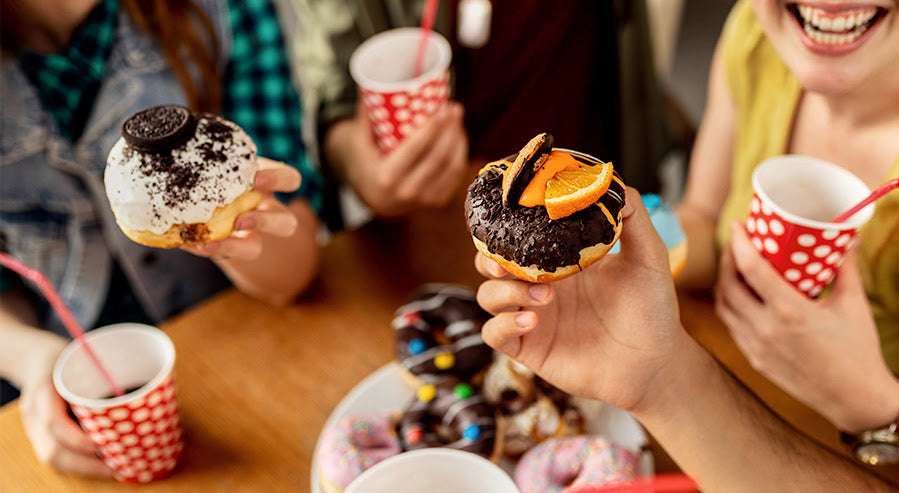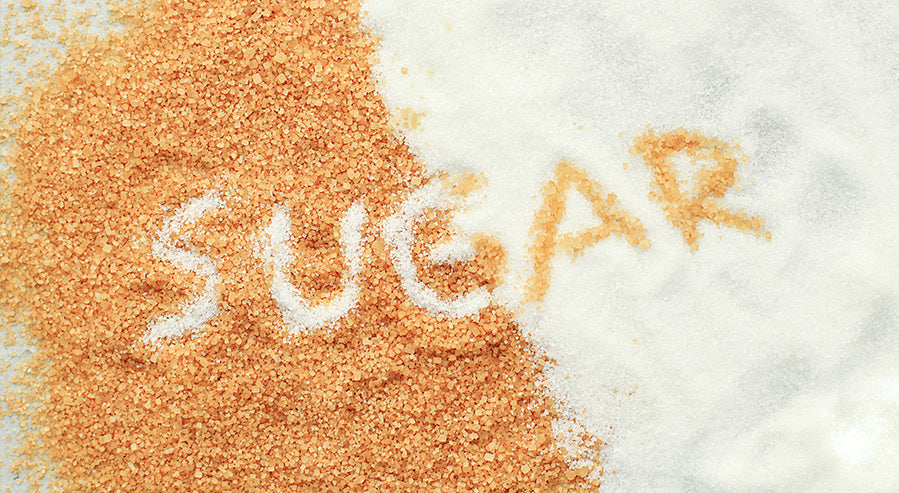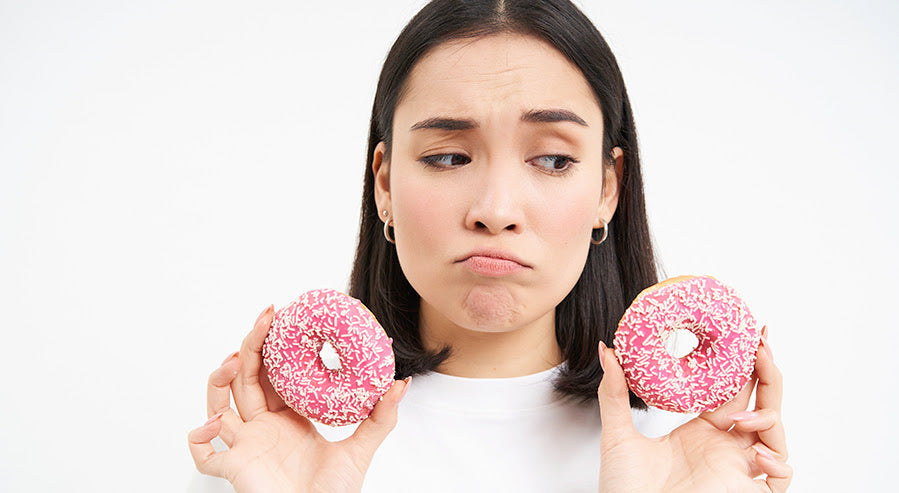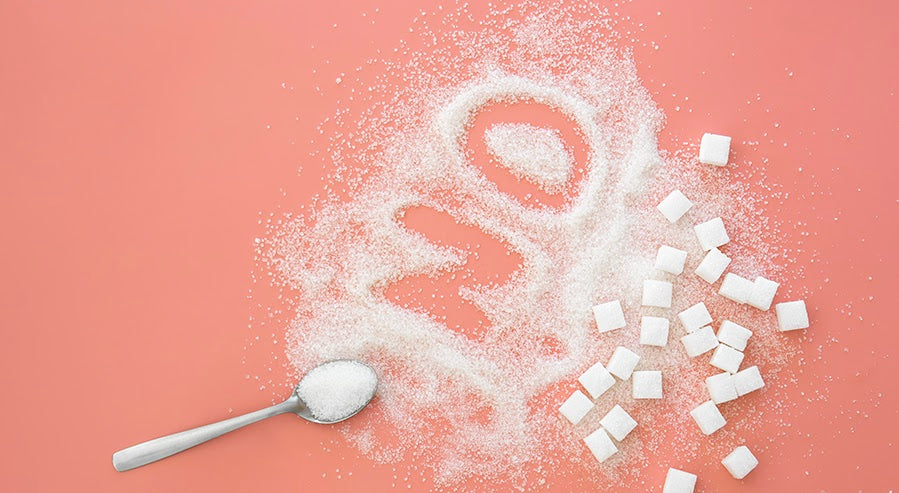Ever struggled to say no to an extra slice of cake or a midnight snack that's more sugar than substance? You're not alone in this.
Sugar has this sneaky way of popping up in our meals, which makes the idea of cutting it out feel like climbing a mountain. But what if I'm talking about having strong willpower? Giving up sugar is a battle that's both physical and mental.
So, let's talk about it and really get to the heart of the matter!
Why Are Humans Attracted to Sugar?
We're wired to love sweet things, and I'm talking about this because, honestly, we lack self-control. Our DNA craves sugary snacks. Our ancestors were always on the lookout for high-energy foods to keep them going, and whenever they stumbled upon something sweet, their brains would reward them with a hit of dopamine. That feel-good chemical kept them coming back for more.
But here's the thing - reaching for a candy bar every time we're feeling down or in need of a pick-me-up can turn into a habit before we know it. Why? Because sugar gives us a quick energy surge by spiking our blood sugar levels.

The problem today is that our diets are overloaded with sugar, and that's not good. Our bodies weren't made to process such large quantities of it. And if you think going for artificial sweeteners is the solution, think again. They might just make you crave more sugar.
Why do you suddenly feel the need to raid the cookie jar? It could be your body yelling for nutrients it's missing, like magnesium. Magnesium helps with insulin control, but when we're running low, sugar seems like the next best quick-fix energy source. Plus, who hasn't reached for a sweet treat when feeling a bit low? It's that temporary mood lift from sugar that we usually use as a band-aid for stress or sadness.
How Does Sugar Affect the Brain?
Talking about how sugar plays with our brains is a bit like revealing a sneaky trick. Eating sugar does something wild - it messes with our brains almost like addictive substances do. Why is it so hard to say no to an extra slice of cake? That's because sugar can hook us, which makes quitting sugar feel as tough as kicking any other habit. Our brains actually need glucose to function properly - it fuels our thinking, memory, and learning. But when I'm talking about needing glucose for energy, it's how sugar addiction tinkers with our dopamine levels. Dopamine is this feel-good neurotransmitter that surges when we eat sugar, egging us on to indulge more.
Here's where it gets even harder. Sugar is making us crave more sweets; it's also doing a number on our memory and could even lead to cognitive decline. The hippocampus, our memory's HQ, doesn't do well on a sugar-high diet. It leads to fewer neurons and more inflammation. Plus, sugar doesn't work well with the prefrontal cortex - the part of the brain that helps us make decisions and keep our impulses in check. This makes resisting those sweet temptations a real challenge.

But the story doesn't end with just brain changes. Too much sugar increases the risk of obesity, Type 2 Diabetes, and even dental problems. It's more than about gaining weight; it's a trigger for various health issues. The advice out there is to keep added sugar under 25 grams a day, but let's be honest: when something tastes so good, it's difficult to resist. Honestly, this is all to say that sweet things satisfy a craving - it's a complex factor in our health and happiness.
Sugar Crashes and Cravings
Talking about the whole sugar crash scene, it's clear our battles with sugar aren't just about having strong willpower; it's more about how our bodies tick. Every time I go for something sweet, it's like my energy levels take a nosedive shortly after. Here's the thing - eating sugar shoots your blood sugar up fast. That quick energy improvement doesn't stick around because our bodies pump out insulin to get those sugar levels back to normal, and that's when the slump hits. Suddenly, you're feeling low, cranky, and finding it hard to focus, which makes the idea of reaching for more sugar pretty tempting.
Getting to the heart of sugar crashes really shows why it's important to have balanced meals. I'm all for thinking that balancing our diet is cutting down on sugar and filling our plates with proteins, fibers, and healthy fats to keep those blood sugar levels steady. Planning my meals and picking snacks that are rich in nutrients has been incredible for keeping blood sugar spikes at a distance.

When it comes to beating sugar cravings, it's a bit of a mind and body project. Sugar sets off the release of feel-good chemicals in our brains, which is why breaking up with sugar can be tough. But, when cutting back on sugar bit by bit and paying extra attention to processed foods that sneak in added sugars, I've made some headway. Picking more fruits and legumes has been a big win for me. They don't just curb the cravings; they pack in fiber and nutrients, which makes me feel full longer than any sugary snack ever could.
Habits and Emotions
Reaching for a candy bar feels a lot like looking for a hug sometimes, right? When we're feeling down or stressed, it's super easy to think that a bit of sugar might just be the fix we need. But here's the twist - it's actually a sneaky trap. Every time we trust sugar to lift our spirits, we end up feeling worse. It's kind of like being stuck in a loop of craving more and then feeling guilty for giving in. I had to face it: sugar wasn't fixing anything for me.
Turns out, talking about a bag of sweets might do more harm than good, especially for our mental health. There are a bunch of studies out there that show people who really go to town with sugary snacks and drinks are setting themselves up for a tougher mental health battle. The goal is chemistry - the way sugar plays with our brains and moods could actually be kicking our mental health in the shins.
And when stress hits, if sugar is your favorite comfort friend, it's kinda like putting a band-aid on a leaky pipe. It doesn't fix the real issue; it just covers it up for a bit. I noticed I was reaching for sugar as a quick fix for stress, but it wasn't helping me deal with the real issues.

To put it basically, kicking sugar to the curb is as hard as it sounds. You might get hit with some not-so-fun feelings like worry, mood swings, and even some headaches. But when that happens, I tell myself it's all part of the process of feeling legitimately better. Those withdrawal symptoms? They're just signs you're moving forward.
Since cutting back on sugar, my brain feels like it's had a tune-up. My thoughts are clearer, and remembering things has gotten easier. There's lots of science poking around showing that too much sugar might be dulling our brains. Basically, it's a wake-up call to ease up on the sweet things.
So, reaching for sugar when we're feeling low is a short-lived fix. Honestly, stepping back and thinking, "Maybe sugar isn't the answer to handling tough emotions," is legitimate. By getting curious about healthier ways to cope and making choices that don't involve sugar, we're taking steps towards breaking free from its emotional grip.
Why Is Sugar Everywhere?
Taking a look at our daily spoonfuls (or more) of sugar, it's clear why cutting back is such a tough cookie. Sugar makes everything taste better, from your morning cereal to that late-night snack, which makes it a staple in too many items on our grocery lists. Have you ever noticed how even your bread and salad dressing are sweeter than you expected? That's sugar hiding in plain sight.

Since the 80s, when fat-free food became the rage, but nobody wanted to give up on tasty food, sugar has become a favorite to keep our taste buds happy. This swap has led us to where we are today - a world where sugar is both everywhere and cheap, which makes it a favorite for food manufacturers.
But here's the thing - sugar is delicious; it's addictive. I'm talking about liking sweet things; our bodies start to crave it, which makes it a real challenge to cut down. And let's not even start on how food companies push sugary treats on us, affecting everything from what we think is good for us to what rules are made about food.
What's more, depending on where you are in the world, there's a whole tangled web of rules about sugar, which makes it difficult to combat its omnipresence in our diets. The US and the EU can't seem to agree on how to handle added sugars, showing just how complicated it is to address this issue on a widespread scale. So, yes, we need to keep an eye on our sugar consumption; it's a sneaky thing.
What Happens When You Try to Quit Sugar?
Deciding to cut down on sugar has my body throwing fits, kind of like it's missing its assistant. At the start, it's like I'm wrestling with my own willpower, dying for a piece of candy or a gulp of soda - anything sweet, really. I'm both talking about wanting something sugary; it feels more like my body's screaming for it, loud and clear.
The first few weeks are the hardest. My body's so used to getting its sugar fix that not having it feels like a big blow. It turns into a bit of a tug-of-war between what I'm used to and what I'm trying to achieve.
Then there's the rollercoaster of moods, and a bunch of worrying that seems to pop up out of nowhere. It's like my brain is trying to trick me into eating sweets just to feel a bit of comfort. And don't get me started on the sleep issues - it's all over the place, leaving me groggy and a bit out of sorts, which makes me second-guess my decision to quit sugar.

Physically, there is no walking in the park either. One minute, I'm dealing with dizziness and feeling like I've hit a wall, and the next, I have this weird, jittery energy. Suddenly, carbs become my new assistant, which makes every day feel like a guess of how I'll feel.
But, if I stick with it, things slowly start to turn around. My energy levels start to stabilize, my mind seems sharper, and I'm not as worried about health issues like heart disease or diabetes that come knocking with too much sugar. This shift doesn't happen overnight, but gradually, I begin to see the light at the end of the tunnel, and all those rough days start to feel like they were worth the fight.
Tips to Make It Easier to Quit Sugar
I kicked my sugar habit by shaking things up with my day-to-day habits. First thing I did? I cleared out all the sugar-packed snacks from my pantry. Honestly, it was kind of a bummer at first not to see my favorite treats, but it made a huge difference. I also started cutting back on how much sugar I added to the things I ate, which is usually a lot less than what most food manufacturers toss in there. What's cool is that this made me appreciate the real taste of food much more and helped me cut down on sugar a lot.
I've gotten pretty good at playing detective with food labels to spot all those sneaky sugars hiding under fancy names like brown rice syrup or molasses. This move has really cut down on the amount of hidden sugar I was unknowingly consuming. Also, mapping out my meals in advance? Game changer. Kicking off my day with something healthy seriously keeps those sugar urges in check for the rest of the day. Plus, planning ahead means I'm not reaching for the first sweet thing I see when I'm slammed.

Adding more fiber to my plate and getting adventurous with new flavors have been a big help in cutting down my sugar reliance. Getting enough protein and fiber means my blood sugar doesn't go on a roller coaster, which, As you might expect, means I'm not dying for a sugar fix every afternoon. And diet drinks, which I thought were helping? They actually made me crave sugar more, so they're out.
I've also got a game plan for when those sugar cravings hit. Knowing my weak places and keeping healthy snacks ready makes fighting off the urge to indulge way easier. And don't get me started on the power of a good night's sleep - it's a huge help. Being rested means I'm not looking for a sugar rush to get me through the day. Last but not least, keeping sugary snacks out of sight means they're out of mind, which really helps keep my sugar intake in check.
Finding The Perfect Blend
Sugar addiction is a willpower; it's a combination of physical, mental, and environmental factors. Getting familiar with it means very understanding the package - from why we crave sugar to how we can change our eating habits for good.

At Teami, we're all about tackling sugar addiction with a smile. We know that having the right support can make all the difference. That's where our natural tea blends come into play, designed to improve your health. If you're looking to shed some weight, catch better sleep, improve your immune system, or just feel awesome in general, we have tea for that. Plus, our range is tasty; it's also about supporting your internal health and making sure your skin looks and feels great.
So, when you drop by our store, you're both picking up a healthier lifestyle and joining a community ready to cheer you on toward your health goals.